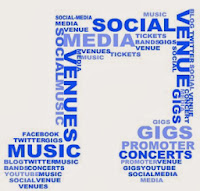Benefits
- It is extremely easy to connect and build relationships to people, including fans and music professionals. Facebook is great for networking and spreading word of mouth about you and your music.
- Facebook is one of the quickest ways to gain a large audience.
- Facebook helps build credibility around your brand and helps raise your brand recognition.
- Facebook is great for visual content. It is easy to post photos of your band's logo or photos from your live shows. This also helps with raising awareness.
- Facebook helps greatly with steering traffic to your actual website (which you should have!).
- Great for announcing events of any kind.
- Option of free advertising. You do not have to pay to create a Facebook page.
- Facebook is easy!
Drawbacks
- Maintaining a Facebook account can be time consuming, and can represent you in a negative light if you are not constantly updating it.
- One downfall to having a public profile is that anybody can comment. This means you will probably encounter, at some point, someone who does not like your music. It happens! What matters is how you respond to negativity or criticism.
Twitter
Benefits
- Twitter is extremely personal. Your fan base can engage with you directly very easily.
- Twitter is immediate, which is preferable for most things in our generation.
- It is easy to locate users with similar interests on Twitter, which is great for target marketing. You can do this by searching hashtags or mentions, either anywhere or specifically in your area.
- Twitter is great for market research. Rather than doing surveys or questionnaires, using twitter allows you to easily see how people are responding to you and your music.
- Twitter is not expensive. Enough said.
- Twitter updates are comparable to press releases. You can get the word out about changes or updates right away, and Twitter word travels extremely fast.
Drawbacks
- Twitter is not the ideal place for visual content. Sure you can link to a photo, and recent updates have made it possible to see a preview of a photo, but it is not the same as seeing a full-view photo right when you come across it.
- Twitter is extremely busy and people get distracted very easily. It is easy to get lost in the mix.
- You have a limited amount of characters to get your message across.
- You cannot freely advertise. You must get approval before you can use Twitter's promotion features, which can be a hassle.
Spotify
Benefits
- It is not very difficult to get your music on Spotify, especially if you already have your music on iTunes.
- You get to create an artist profile page, which again can allow fans to get to know you more personally. You can also link back to your website from here which, if you haven't figured out yet, is extremely important.
- You can make playlists and help other artists out, which in turn will help you out. Connecting with other artists will only benefit you in the long run.
Drawbacks
- If you are an unsigned new musician, don't expect to make much money from Spotify. Royalties are very low for indie/unsigned artists.
- Spotify may discourage legal downloading of your music. If you can stream music for free online and download it as an offline playlist to your phone, why would you need to pay for the song somewhere else?
Pinterest
Benefits
- Very easy to integrate with other sites using Pinterest.
- Awesome way to link back and drive traffic to your website.
- Great for market research. You can easily track and follow peoples specific interests and find out who to reach out to.
- You can convert browsers into buyers by posting where they can go to listen to/download your music.
Drawbacks
- Pinterest takes a lot of time and devotion to maintain. Don't begin unless you have the time to stick to it.
- Not as much user interaction on Pinterest as on other social media sites.
Hopefully after reading this you can decide which social media networks will be best for you to use to promote your music! If you would like some tips on social media marketing, read my previous post here.









